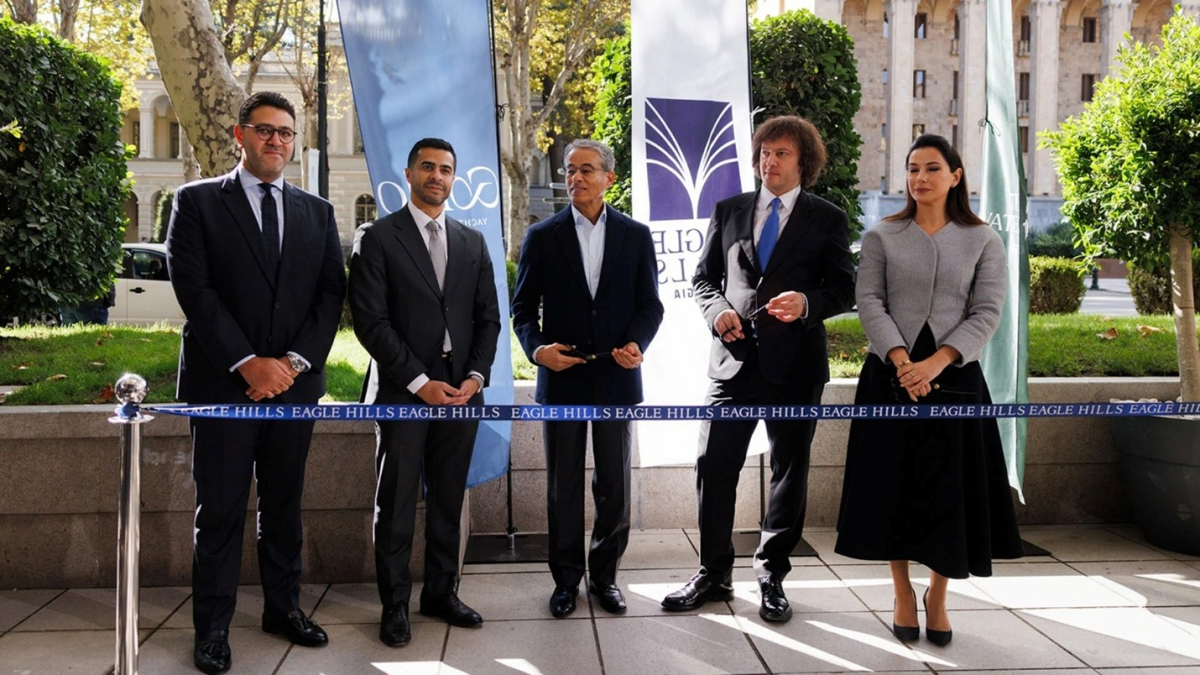Trump says additional talks with Iran expected on Friday
Tensions between the U.S. and Iran are escalating, with Washington ordering a significant military build-up in the region and multiple countries evacu...

Georgia’s record $6 billion Eagle Hills deal promises luxury and growth but secrecy, land use, and environmental concerns are fuelling public protest and debate.
A deal hailed as the largest investment in Georgia’s history is now at the center of growing public controversy. The government’s $6 billion partnership with Abu Dhabi–based Eagle Hills, once celebrated as a symbol of progress is facing calls for transparency, environmental concerns, and questions over its real economic value.
On November 10, protesters gathered outside the government administration under the slogan “To Protect Land and Water”, demanding the full text of the agreement be made public.
The demonstrators accused the government of “selling out national assets” and warned of environmental and social risks tied to the project.
A Golden Deal or a Glittering Illusion?

Signed on October 22, the agreement between the Georgian government and Eagle Hills was introduced as a historic moment. Prime Minister Irakli Kobakhidze and Minister of Economy Mariam Kvrivishvili hosted the founder of Eagle Hills, Mohammed Alabbar, at a high-profile ceremony where they declared the partnership a “new chapter in Georgia’s development.”
Under the deal, Georgia will contribute nearly 850 hectares of state-owned land — including 260 hectares on the Gonio coast near Batumi and 590 hectares of forest-park territory near Tbilisi — in exchange for a 33% stake in the joint venture. The total investment, officials say, will exceed $6 billion across two major projects: Tbilisi Waterfront and Gonio Marina.
Yet, the precise terms remain secret. The “Investment Agreement” and “Shareholders’ Agreement” were both declared commercially confidential by government decree — a move that immediately triggered backlash from economists, environmentalists, and opposition figures.
A Project Framed as a National Milestone
The agreement makes Georgia a 33% shareholder in a joint venture with Eagle Hills. The state’s contribution includes 260 hectares of land on the Black Sea coast in Gonio and 590 hectares near Tbilisi’s Krtsanisi Forest Park, areas designated for luxury residential and commercial development.
Prime Minister Irakli Kobakhidze has repeatedly called the project a symbol of Georgia’s economic maturity and a step toward long-term prosperity.
“The Eagle Hills project will make an unprecedented contribution to stimulating our economy,” Kobakhidze said while speaking to journalists in China. “Poverty has fallen from 30% to 9.4%. This year our economy will exceed $10,000 per capita for the first time. These projects will raise the welfare and living standards of our population.”
According to the Prime Minister, the initiative shows that Georgia is now “at the height of its calling,” capable of attracting global investors while safeguarding national interests.
Minister of Economy Mariam Kvrivishvili insists the agreement protects the country’s interests and marks a shift from past investment models that left Georgia at a disadvantage.
“The state has not assumed any financial obligations or issued guarantees,” Kvrivishvili said. “This is a case where the government put the state’s interests first. The state becomes a co-owner — not just a facilitator — and will receive dividends and direct income for the budget.”
She added that the deal does not grant special privileges to Eagle Hills and the project will contribute to GDP growth, create thousands of jobs, and attract hundreds of thousands of new visitors annually.
The Economics Behind the Headlines
Government officials describe the deal as transformative, claiming it will generate thousands of jobs and position Georgia as a new hub for high-end development. But economic experts are not convinced.
Analyst Akaki Tsomaia argues that the state’s contribution — vast tracts of valuable land — could ultimately cost more than it earns.
“The government is effectively trading an asset worth around $2 billion for an expected return of roughly $396 million,” Tsomaia says. “Once the land is developed and sold, its value to the public becomes zero — it can’t be reused or recovered.”
He estimates that, in reality, Eagle Hills will spend about $2 billion in direct investment, not the full six. Profit margins of 40% could be achieved if units sell at international luxury rates — but that depends on a market where only about 1,000 high-end properties are sold annually.
“At that rate, it could take 15 years to sell 15,000 units,” Tsomaia notes. “The numbers don’t add up unless demand grows far beyond current levels.”
Luxury Vision Meets Local Reality
Eagle Hills’ Tbilisi Waterfront and Gonio Marina promise to bring “future cities” to Georgia — high-end residential and leisure zones with international standards. But such projects also come with a price tag that may only be accessible to the wealthy.
Critics argue the developments risk creating exclusive enclaves for foreign buyers, disconnected from Georgia’s broader economy. According to the company, up to 60% of units may be sold to non-residents, primarily investors from the Gulf region.
Former National Bank President Roman Gotsiridze calls it “a luxury bubble dressed up as economic development.”
“It’s a one-time construction project that benefits a few, not a long-term economic strategy,” he says.
Environmental and Cultural Concerns
Environmentalists have voiced alarm about the project’s potential impact, particularly in Krtsanisi Forest Park, one of Tbilisi’s last remaining natural green zones.
“This area is the city’s lung,” warns former Environment Minister Nino Chkhobadze. “If it’s turned into a dense residential zone, we lose a crucial air corridor that keeps Tbilisi breathable.”
At the same time, controversy has surrounded the new Eagle Hills office, which recently opened in the historic “Kino Rustaveli” building — once home to one of Tbilisi’s most iconic cinemas. The building had been closed for years for supposed restoration, but locals were surprised to learn it had been repurposed into a luxury real estate showroom.
For many, the choice of location is symbolic — a reminder of how public and cultural spaces are being replaced by commercial ones.
A Record Investment Shrouded in Secrecy
The protest movement demanding transparency has been growing since the government classified the agreement.
“The public has the right to know what is being promised, what is being sold, and at what cost,” said one protester at the “To Protect Land and Water” demonstration. “We are not against investment, but we are against secrecy.”
The Ministry of Economy insists the project will comply with all laws and environmental regulations, while Eagle Hills says more details will be shared “in due course.”
Still, for a project of this size — the largest in Georgia’s modern history — many believe secrecy undermines public trust.
Promise or Price?
To supporters, the Eagle Hills partnership signals confidence from a global investor and a rare chance to reshape Georgia’s landscape. To critics, it’s a risky exchange of land for uncertain returns, wrapped in political fanfare.
What’s clear is that the project whether a triumph or a warning, will test Georgia’s ability to balance economic ambition with transparency, sustainability, and public trust.
Tensions between the U.S. and Iran are escalating, with Washington ordering a significant military build-up in the region and multiple countries evacuating diplomatic staff amid fears of further instability.
The situation in Cuba was heating up and called for restraint following a deadly incident involving a Florida-registered speedboat off the coast of the Caribbean island, the Kremlin said on Thursday (26 February).
Another shipment of petroleum products from Azerbaijan to Armenia has been dispatched, with 39 rail tank cars carrying 4,500 tonnes of diesel fuel sent today, Report informs.
Russian President Vladimir Putin’s special envoy, Kirill Dmitriev, arrived in Geneva and may hold talks with U.S. officials, according to the RIA news agency.
Pakistani air strikes hit a weapons depot on the western outskirts of Kabul overnight, triggering hours of secondary explosions that rattled homes across the Afghan capital and left residents fearing further violence.
Abdullah Öcalan, the jailed leader of the outlawed Kurdistan Workers’ Party (PKK), issued a statement on Friday (27 February) calling on Ankara to adopt legislation aimed at promoting political inclusion.
Pakistani air strikes hit a weapons depot on the western outskirts of Kabul overnight, triggering hours of secondary explosions that rattled homes across the Afghan capital and left residents fearing further violence.
Pakistan’s declaration of an “open war” with Afghanistan must be understood in the context of months of escalating violence, regional analysts have said, describing the latest developments as a significant shift in the nature of the conflict.
Israeli strikes killed five people in Gaza on Thursday (26 February), according to health officials in the territory. The Israeli military said separately that it had killed a militant who posed an imminent threat to its forces in southern Gaza.
Iran’s Foreign Minister Abbas Araghchi on Friday urged Afghanistan and Pakistan to resolve their differences through dialogue, offering Tehran’s assistance to facilitate understanding between its eastern neighbours.
You can download the AnewZ application from Play Store and the App Store.

What is your opinion on this topic?
Leave the first comment